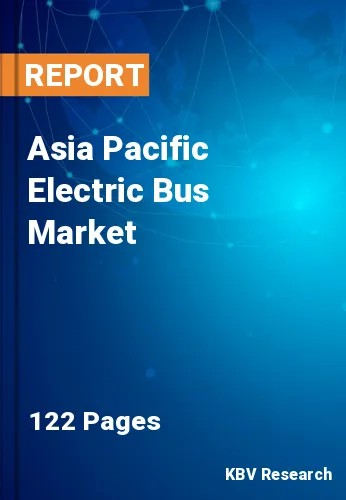The Asia Pacific Electric Bus Market would witness market growth of 21.1% CAGR during the forecast period (2023-2030).
As economies develop, transportation activity rises, which also causes the sector's emissions to rise. Electric vehicles have undergone tremendous technological advancements over the past 20 years, which have decreased their costs, lessened their environmental impact, and boosted their utility. As a result, the demand for electric vehicles like electric buses has increased as shared mobility and public transportation are also essential components of effective transportation.
The demand for electric buses on the market is further fueled by several initiatives taken by automakers to invest in the manufacturing of electric buses powered by hydrogen fuel cells. Further, it is predicted that during the projection period, multiple opportunities will be presented to the stakeholders due to increased technological improvements in terms of expanding mobility range and the construction of fast-charging infrastructure.
In the region, several nations have decided to implement sustainable mobility in their national public transportation systems. For instance, the Maharashtra State Road Transport Corporation and other cities in India have introduced electric buses. Using upfront subsidies and the development of EV charging infrastructure, the Faster Adoption and Manufacturing of Electric Vehicles in India Phase II (FAME India II) Scheme aims to increase demand for electric vehicles (EVs). According to the Government of India, a total of 7,090 electric buses would receive subsidies as part of FAME II. Under FAME II, Rs 1000 crore has also been set aside to install EV charging stations. 835 electric buses have been deployed in calendar year 2021 so far. As a result of the convergence of the aforementioned variables, electric bus purchases in the Asia Pacific are predicted to expand at a robust pace.
The China market dominated the Asia Pacific Electric Bus Market by Country in 2022, and would continue to be a dominant market till 2030; thereby, achieving a market value of $23,899.2 Million by 2030. The Japan market is experiencing a CAGR of 20.1% during (2023 - 2030). Additionally, The India market would showcase a CAGR of 21.9% during (2023 - 2030).
Based on Battery Type, the market is segmented into Lithium Iron Phosphate, and Lithium Nickel Manganese Cobalt Oxide. Based on Vehicle, the market is segmented into Battery Electric Vehicle, Plug-in Hybrid Electric Vehicle, and Fuel Cell Electric Vehicle. Based on Application, the market is segmented into Intercity, and Intracity. Based on End-use, the market is segmented into Public, and Private. Based on countries, the market is segmented into China, Japan, India, South Korea, Singapore, Malaysia, and Rest of Asia Pacific.
Free Valuable Insights: The Worldwide Electric Bus Market is Projected to reach USD 121.2 Billion by 2030, at a CAGR of 20.8%
The market research report covers the analysis of key stake holders of the market. Key companies profiled in the report include BYD Company Ltd., Volvo Group, Solaris Bus & Coach sp. z o.o. (Construcciones y Auxiliar de Ferrocarriles, S.A.), Volkswagen AG, Nissan Motor Co., Ltd, Ashok Leyland Limited (Hinduja Group Ltd.), Mercedes-Benz Group AG (Daimler Truck Holding AG), Yutong Bus Co., Ltd., Tata Motors Limited (Tata Group) and Hyundai Motor Company.
By Battery Type
By Vehicle
By Application
By End-Use
By Country
Our team of dedicated experts can provide you with attractive expansion opportunities for your business.

